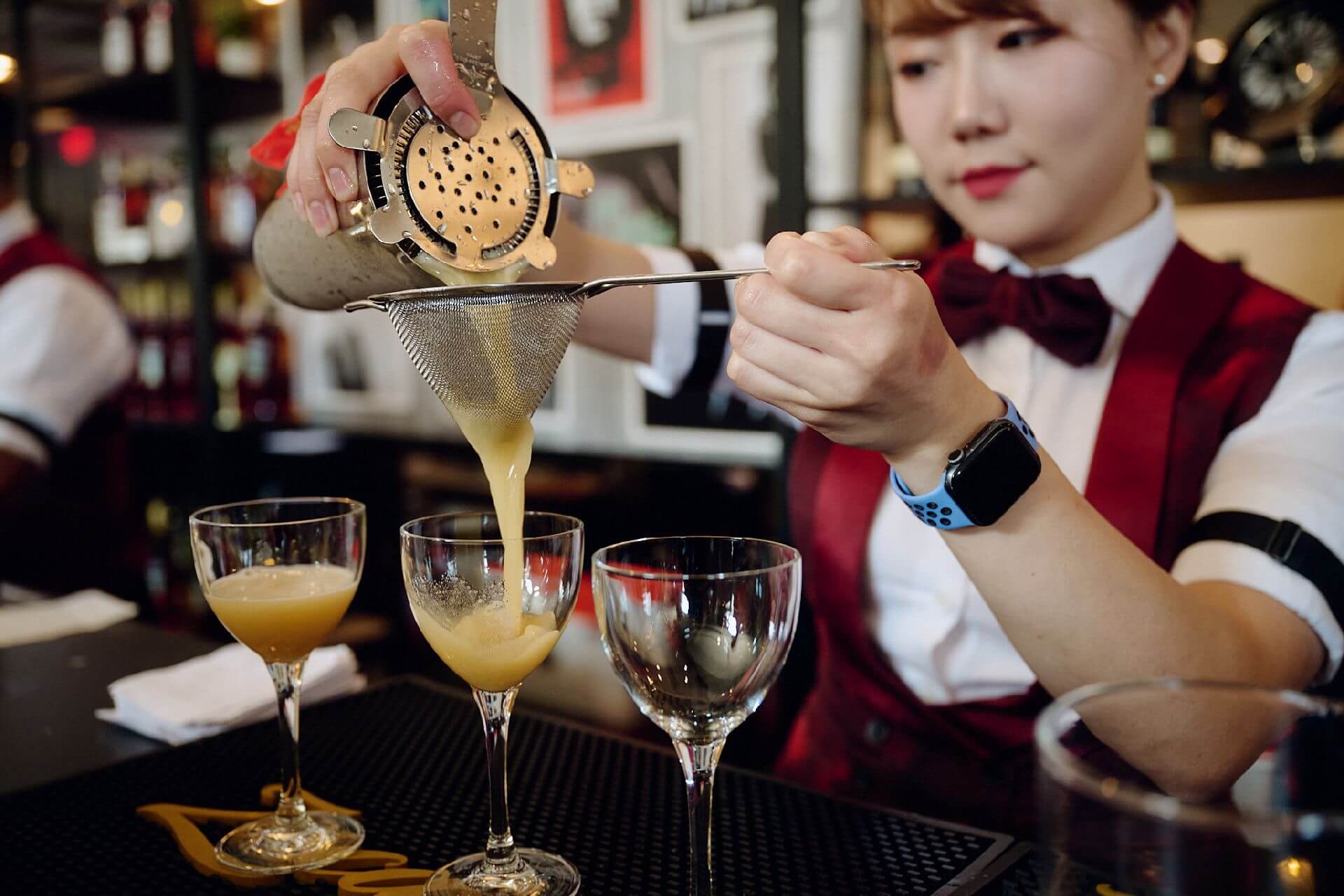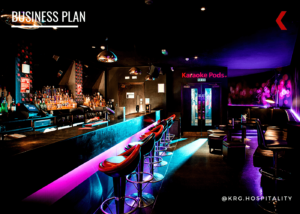Triple Threat: A Bar Owner Master Class
by David Klemt

Three of the most respected bartender-operators formed like Voltron in Las Vegas during the 2024 Bar & Restaurant Expo to impart invaluable wisdom.
In an attempt to prevent the trio from roasting one another, I’ll organize them alphabetically, by surname: Erick Castro, Nectaly Mendoza, and Travis Tober. And yes, I’m aware they’re still going to roast each other.
This triumvirate came together to co-present “Bartender Masterclass: Building Bars that Change the Game Yet Make Money.” An aptly named education session as it was certainly a masterclass.
Importantly, this wasn’t a how-to class on tracking costs. The trio didn’t pop P&Ls up on a screen and explain how to read them. Rather, they delivered the naked truth about becoming a bar owner and chasing success.
Bluntly, the reality is that Castro, Mendoza, and Tober are noticing disturbing trends in bar ownership. People going against their instincts. Hopeful owners accepting terrible deals in a bid to live their dreams. Setting the stage for failure with excuses. No talent as the new talent. A lack of understanding of the fundamentals.
Speaking of fundamentals…
With the jokes out of the way—these three won’t hesitate to spit a bit of good-natured venom at one another—this panel got right to delivering the truth.
Almost immediately, Castro addressed a grim reality. A lot of the panel’s friends and peers own and operate bars that are busy and winning awards. And they’re not not making any money.
When he asks to see their costs, he often hears that the owner doesn’t know that information. That doesn’t work for anyone among this trio.
“You need to follow the fundamentals to make money,” explained Castro.
Adding to that, Mendoza explained the situation succinctly. A lot of the flashy markers of success some bartenders and bar owners flaunt on social media and in their real lives are bullshit.
I can tell you with certainty that Castro, Mendoza, and Tober know their numbers. It’s obvious they have the fundamentals down, and they don’t take them for granted. The same can be said for the teams they build. Nobody’s career is long for any of their businesses if they don’t learn to respect and embrace the fundamentals.
At KRG Hospitality, we also drive home that the fundamentals are keys to success. There’s a reason KRG president Doug Radkey’s first book is subtitled Developing the Fundamentals for an Epic Bar.
There’s no room for excuses.
There’s more than enough on any owner or operator’s plate; there’s no room on it for excuses.
Yet, these three are noticing that many new bar owners seem to be piling their plates high with justifications for impending failure.
“For some reason, no talent is the new talent,” said Mendoza.
Justifications for refusing to learn the business like, “I don’t know accounting,” or, “I don’t know restaurants,” are excuses that lead to two things: more excuses, and the closing of bars.
If you’ve never had the opportunity to hear Mendoza speak, I’ll tell you this: He doesn’t sugarcoat anything. He’s a fun person, he’ll make you laugh, and he wants to see people succeed. Mendoza loves hospitality. However, when it comes to business, the jokes stop.
Let’s not forget that owning and operating a bar is a business. Bars need to make money to stay open. Bar ownership isn’t a reality show, sitcom or movie—it’s stressful. Operating at a high level doesn’t remove stress completely, but it certainly mitigates much of it.
Crucially, embracing the fundamentals and rejecting the impulse to excuse mistakes large and small allows a bar owner to step away from their business eventually. Imagine being able to take actual week-long vacations—plural—as the owner of a bar, without worry. That should be among every bar owner’s goals.
So, when Mendoza says bar owners need to have the guts to learn everything about the business, that’s not hyperbole. And when Castro, who now co-owns the recently opened Gilly’s House of Cocktails, states that someone needs to be genuinely curious about the business to succeed, you can take that to the bank.
Bet on yourself.
“I bet on myself,” said Tober during this panel. He meant that in both the past and present tense, by the way.
When Tober opened the first Nickel City in 2017, it cost nearly a half-million dollars. The goal was to make $800,000 with the bar in its first year. To say that Nickel City surpassed projections is a bit of an understatement.
It did $2.4 million. The bar now generates $3 million per year on average. The latest Nickel City outpost in Houston cost $1.3 million. On average, Tober and his tight-knit group pay back investors in 18 months.
On episode 50 of our Bar Hacks podcast, Tober “jokes” that he wants a Nickel City in every major city throughout the US. If you want to listen this conversation, here’s the Spotify link, and here’s the Apple Podcasts link.
Given how quickly he and his team lead bars to success, I won’t be surprised if a fourth Nickel City location opens by the start or middle of 2026. Further, I won’t be shocked at all if it’s the first Nickel City outside of Texas.
Again, his success is the direct byproduct of his belief in himself, and an understanding of bar operations that few can match.
It’s not the drinks.
Successful bar operators, embodied by the three who hosted this panel, know that they’re not in the business of selling drinks.
“We’re all in a relationship business,” said Tober. “It’s not about the cocktails.”
This is coming from an operator whose team puts more than 20,000 Frozen Irish Coffees across their bars each year. They’re the second-highest seller of Tullamore DEW.
And you know what else? Tober will give you that recipe. In fact, he’ll tell you that all you have to do is visit the Erin Rose in New Orleans and modify their recipe.
Tober will give you that recipe—all of his recipes, if I had to guess—because you could open a bar across from one of his and having his drinks won’t make your venue a threat.
That’s betting on yourself.
Someone may be a better bartender than Tober, if one were able to put stats on the role. But Tober won’t be bothered, confident in the knowledge that they won’t tend bars better.
Setting ego aside, Tober told the room at Bar & Restaurant Expo that about once every three months, he reminds his team that he’s a C student and a college dropout. People could easily write him off as just some loud bar guy.
However, he knows the bar business in general and his bars in particular at the highest level. And he knows that he’s the guy people would like to sit down with to have a beer and a shot. As he told that room in Las Vegas, he gets by on his personality. That personality bleeds into the heart and soul of his concepts and informs the level of service and hospitality that makes everyone feel welcome.
As important, Tober also feels that bar owners are in the entertainment business. He ensures that he and his team give guests a reason to want to visit and hand over their money.
Trust your instincts.
Let’s trek back all the way to the point about some of the world’s most-awarded bars not making any money.
In some instances, it’s more accurate to say that the well-known bartender-operator isn’t getting paid. Yet another way to frame such a situation is to refer to the bartender-operator as the face of the bar.
I say they’re the face because their ownership stake is likely under 25 percent. In fact, it’s probably 20 percent or lower. The controlling stake is owned by one or more investors.
So, the bartender-operator’s vision has turned to brick-and-mortar. Their hard work turning their dream to reality is resulting in traffic, media coverage, and awards. But they’re also taking on all the stress of everyday operation while most likely struggling to pay their own bills.
They haven’t attained their dream—they’ve gotten a job. Worse, it’s an incredibly stressful job, and they’re not being compensated properly.
Driving home this point was an interaction between an audience member and Mendoza.
Would you take this deal?
This future bar owner (assumedly, and hopefully) was asking about seeking funding through investors. It was revealed that the project would likely cost around $600,000.
So, illustrating how easily a person may be tempted to leap into a bad deal to have what they think is their dream, Mendoza said he could fund that project (hypothetically). However, he would want 87-percent ownership in exchange (again, this was hypothetical). Mendoza went on to guess that the audience member and his partners would take that deal—and that they absolutely shouldn’t, because it’s a terrible offer.
Rationally, most of us would know that’s a bad deal and that we should walk away. That includes the audience member who interacted with Mendoza.
But we can all be susceptible to the “lizard brain” inside us. This is the portion of our brain that causes us to act on emotions rather than logic. There’s your dream! Your heart is pumping so hard you can hear it thumping in your ears. All you have to do is sign and it’s “yours,” at the cost of 80 percent or more of its ownership.
If a deal seems off, trust your instincts, walk away, and seek the right partners.
When you do land the right deal…
“…take the fucking shot,” says Mendoza.
In this instance, “the right deal” means a bar within your budget, cautioned Castro. Buy what you can afford.
Mendoza owns and operates award-winning concepts Herbs & Rye and Cleaver — Butchered Meats, Seafood & Classic Cocktails in Las Vegas. He shared that Cleaver is the concept he envisioned first. At the time, however, he had the budget to build Herbs & Rye.
So, he built Herbs & Rye in 2009. He trusted his instincts and, like Tober and Castro, bet on himself. In 2018, he opened the doors to Cleaver.
Could he have blown his budget and built Cleaver first? Sure. And we probably wouldn’t have either bar and restaurant now had he not been pragmatic. The industry more than likely wouldn’t have Mendoza to share his wisdom and mentor future operators.
“Your first bar is your best work. It’s like your first album—raw and uncut,” Mendoza says.
When it’s time for a second location, create something different. Get a bit uncomfortable.
“I think there’s a big disconnect about what being a bar owner is,” says Mendoza. “Success will create the fastest path the farthest away from what brought you success in the first place.”
How many sophomore albums from artists receive critiques that they’re good, just not as good as the freshman release?
When you’ve got the fundamentals down, when you understand your business at a high level, you keep that experience and wisdom. Getting uncomfortable and taking on a new challenge isn’t as risky as it was with your first bar.
So, take the fucking shot.
Seriously, trust your instincts.
There’s an episode of Castro’s award-winning Bartender at Large podcast that every bartender and hopeful bar owner should give a listen.
On episode 320, released in October of 2022, Castro gave Moe Aljaff the opportunity to tell the story of Two Schmucks. Mere days after earning the number seven spot on the 2022 World’s 50 Best Bars list, Moe and most of the team left the bar.
The situation that affected the Two Schmucks team is more common than some would like to admit, unfortunately. It inspired the cautionary phrase, “Don’t get Schmucked.”
To listen to Aljaff’s story, follow this link to the podcast episode on Spotify. After you’ve listened to that eye-opening episode, consider giving number 236 of Bartender at Large a play. It’s a conversation between Castro and Daniel Eun, a bartender and practicing attorney. This link will take you to the podcast’s website, where this episode has been embedded.
Image: Shutterstock. Disclaimer: This image was generated by an Artificial Intelligence (AI) system.












